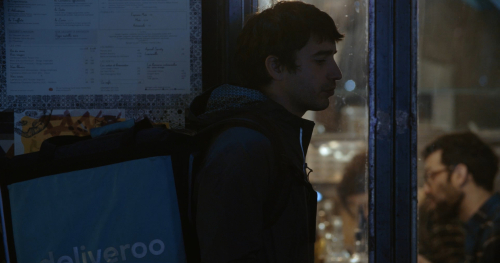
Les idiots, 21 Juin Cinéma
MOVIE REVIEW
The World After Us (2021)
Anyone who dreams of the romance of Paris should watch this adorable love story for a reality check. It’s expensive being broke, especially in Paris, so Labidi (Aurélien Gabrelli, utterly lovable) is having a tough time. He is so broke the bedsit he shares with his awkward friend Alekseï (Léon Cunha Da Costa) is only wide enough for a single bed, a shower stall and a kitchenette. They must take it in turns to sleep on the floor; but since there is something of the Simon Pegg-Nick Frost dynamic between them there’s no friction or drama. Labidi has an education, as well as parents who love him, but they are barely scraping by themselves, and he’s not so young anymore that he can lean on them. But then there are two pieces of luck. A short story Labidi wrote wins a contest, which gets him an agent (Mikaël Chirinian), and the agent gets him a meeting with a publishing house, who ask him to deliver a novel within six months. And then, on a visit down south to Lyon to tell his parents the news, Labidi sees a young woman named Elisa (Louise Chevillotte), and the whole world changes.
The movie is a profoundly charming slice of life of the six months leading up to the deadline, during which Labidi concentrates on falling in love. Elisa is still a student, dependent on her parents as she works for her degree, but how could she not be enchanted by a man who stands up at karaoke, tells the whole restaurant how much he loves her, and then sings a cheesy old standard about all your dreams coming true? Alekseï is delighted for them, even though their apartment is utterly inappropriate for three (it’s barely appropriate for one), so Labidi immediately starts working out how to get a better place for Elisa and him, by hook or by crook.
This is not the story of a writer’s life, but instead the story of the life a writer must live in spite of his writing. Anyone who has been ground down by city living will understand the grubby little tricks Labidi has to play in order to get ahead. French culture is formal and rule-driven, which means there are rules about how rules can be broken. Everyone in Labidi and Elisa’s circle 1. knows the score, but more importantly 2. is willing to join in with the cheating, lying and occasionally straight-up stealing that are the only chances to get ahead. Nobody enjoys doing this, but in Paris you have to forge an address in a good neighborhood in order to be allowed to move into a good neighborhood; it’s knowing how to game the system that opens the doors. It’s so obvious that Labidi’s non-French name has been a problem that the movie doesn’t waste time dwelling on it. Ethics aren’t ignored, but when the rules aren’t bending in your favor, the movie shrugs and shows how you have no choice but to break them.
The movie’s main weakness is that Elisa is seen only through Labidi’s eyes; Suzanne, his sympathetic manager in an optician’s (Noémie Schmidt), has more of a personality though decidedly less screen time. It’s entirely possible that the script is thinly-veiled autobiography by writer-director Louda Ben Salah-Cazanas, not least because the costume designer is called Lola Cazanas-Ben Salah. But it’s never self-indulgent. The weary working-class setting shows daily life in the parts of Paris tourists rarely see. A besotted young man working tooth and claw to provide a decent life for the girl he loves is a tale as old as time, but not one often seen in movies anymore. And Mr. Gabrelli’s gentle determination makes it easy to relate to a young man trying desperately to add a little happiness into a world that doesn’t care. Labidi has the skills, the knowledge, the loving support network and the desire to make it. All he needs is the space and time to work on his book. Whether or not he catches the break to make that possible is enough of a hook.
Comments